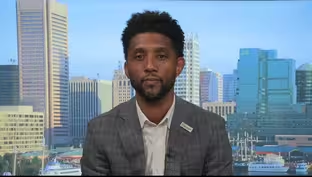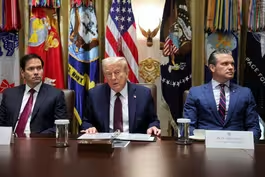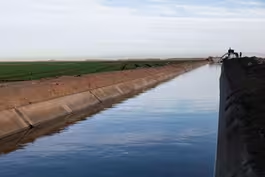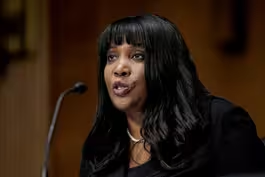
Retired major general slams Trump's National Guard plans
Clip: 8/26/2025 | 6m 54sVideo has Closed Captions
Retired major general calls Trump's National Guard plans 'unneeded and dangerous'
President Trump signed an executive order Monday that said each state’s National Guard units “are resourced, trained, organized and available to assist federal, state and local law enforcement in quelling civil disturbances.” Nick Schifrin discussed the latest with retired Army Major General Randy Manner, the former acting vice chief of the National Guard Bureau.
Problems playing video? | Closed Captioning Feedback
Problems playing video? | Closed Captioning Feedback
Major corporate funding for the PBS News Hour is provided by BDO, BNSF, Consumer Cellular, American Cruise Lines, and Raymond James. Funding for the PBS NewsHour Weekend is provided by...

Retired major general slams Trump's National Guard plans
Clip: 8/26/2025 | 6m 54sVideo has Closed Captions
President Trump signed an executive order Monday that said each state’s National Guard units “are resourced, trained, organized and available to assist federal, state and local law enforcement in quelling civil disturbances.” Nick Schifrin discussed the latest with retired Army Major General Randy Manner, the former acting vice chief of the National Guard Bureau.
Problems playing video? | Closed Captioning Feedback
How to Watch PBS News Hour
PBS News Hour is available to stream on pbs.org and the free PBS App, available on iPhone, Apple TV, Android TV, Android smartphones, Amazon Fire TV, Amazon Fire Tablet, Roku, Samsung Smart TV, and Vizio.
Providing Support for PBS.org
Learn Moreabout PBS online sponsorshipGEOFF BENNETT: Well, part of the# administration's efforts to be## able to send National Guard troops into# cities is a new order by President Trump## to modify the Guard's organization and# training and create rapid response units.
Our Nick Schifrin is here with# that part of the story -- Nick.
NICK SCHIFRIN: Geoff, yesterday, President# Trump signed an executive order that each## state's National Guard units would be --# quote -- "resourced, trained, organized,## and available to assist federal, state, and local# law enforcement in quelling civil disturbances."
And the secretary of defense will create# -- quote -- "standing National Guard quick## reaction force that shall be resource, trained# and available for rapid nationwide deployment."
For perspective on this, we turn to# retired Army Major General Randy Manner,## the former acting vice chief# of the National Guard Bureau.
General Manner, thanks very# much.
Welcome to the "News Hour."
What's your reaction to the president's order,## both this quick reaction force,# as well as the Guard's priority?
MAJ. GEN. RANDY MANNER (RET.
), U.S.# National Guard: I think this is## unneeded and also very dangerous...
This is something where, when I was the acting# vice chief of the National Guard Bureau,## we absolutely already put into place the ability# of having quick reaction forces in every state,## depending on the size, but also the state would# depend on the size of these quick reaction forces.
They were at the time, of course,# targeting the ability to respond## to emergencies in the state such as# floods, hurricanes, forest fires,## earthquakes, and so on to be able# to save lives.
The difference here## is that it's focused on -- quote, unquote# -- "public order."
That's very disturbing.
And also the idea of creating a unit whose# primary mission is to deploy anywhere in## the country to deal with potentially# demonstrations or civil disorder,## as the president sees fit out of the D.C.# Guard, that is not in keeping with the## mission of the National Guard as a strategic# reserve for our military and for our nation.
NICK SCHIFRIN: But if I may ask, one# of the missions of the National Guard,## is it not, to be able to help with law# enforcement.
So what's so wrong if this## vision is to have the National Guard# in fact help with law enforcement?
MAJ. GEN. RANDY MANNER (RET.
): The key# difference is that the governors control## the National Guards whenever they# are not deployed by the president.
As we have seen, not the mayor of# D.C., the mayor of Los Angeles,## no one is requesting this additional assistance.# This is something where the president is imposing## the armed military to go into American cities.# That is the most significant difference.
And## it's very important to remember that civil# disturbance deployments by governors is## actually the smallest amount of missions that have# ever been -- that are done by the National Guard.
It is a rarity, whereas now the# president is elevating it to be## a significant capability for the National Guard.
NICK SCHIFRIN: So let's just step back.# This focus on resourcing, training,## organizing to quell civil disturbances,# how different would that be from how## the National Guard is currently organized?
MAJ. GEN. RANDY MANNER (RET.
): All our young men## and women signed up for perhaps three reasons, to# serve our country, to defend our citizens overseas## against threats and, number two, to be able to# save our citizens in times of natural disaster.
And the third objective, of course, which,# by the way, it's been a very distant third,## but it's on the list, is to be able to# -- as needed by the governor or mayors,## to back up their local authorities, their# law enforcement authorities as needed,## to back them up if perhaps they are overwhelmed# with some kind of an emergency that occurs.
It is not the predominant mission of the# National Guard to do this.
If the president## is concerned about law enforcement, then what# he should do is restore the $100 million to## law enforcement for community engagement to# recruit and train officers in that capacity.
Our Guardsmen on the streets of D.C. right now,# which I was a D.C. Guardsman for 13 years, they## are not trained in law enforcement.
Whereas law# enforcement officers receive four to six months## of training, our young men and women receive# three or four hours of training, not months.
NICK SCHIFRIN: Let's talk about the impact on the# Guard -- Guardsman themselves.
Defense officials## tell me that the quick reaction force would# be able to cover the entire continental U.S.,## which would require splitting up a quick# reaction force, a few hundred in the West,## perhaps Arizona, a few hundred in# the South or East, perhaps Alabama.
Could that work?
And what would be the# impact on the Guard's overall staffing,## the ability to perform those other functions, if# this quick reaction force were created like that?
MAJ. GEN. RANDY MANNER (RET.
): First of# all, the use of the National Guard in## all of these deployments, 4,000 down in# Los Angeles, over 2,000 into Washington,## D.C., are decreasing military readiness because# those soldiers are no longer training for their## combat operations missions.
That's very# important for your viewers to understand.
They are not doing their principal job.
We should# not be using the military against our own people## in any capacity.
This is not the history of# our military, and we should not go there.
NICK SCHIFRIN: And finally, sir, the Guardsmen# who would be part of a quick reaction force## would be on perhaps a one-hour or two-hour# time frame to be able to deploy.
It means,## for example, soldiers couldn't drink.
They# couldn't travel very far with their families.
They would have to be close enough# to the base to be able to respond## that quickly.
What is possible under the# current level of National Guard staffing,## and is that vision something that the# National Guard could even execute today?
MAJ. GEN. RANDY MANNER (RET.
): I was a member of# the 82nd Airborne Division.
We rotated readiness## and we had anywhere between four to eight hours# whenever we were on division ready brigade status.
The National Guard does not operate# that way.
These are part-time citizen## soldiers.
It is something where this# is not physically possible to have a## unit of any size ready to go with 400# people in that way, unless, of course,## you were to triple or quadruple the cup the# size of the unit and rotate people through.
This is not thought through.
This is not# representative of a good, thorough mission## planning.
Even within -- when I was in charge# of Army operations worldwide on the Army staff,## we obviously had to rotate units through Iraq# and Afghanistan, both from the point of view## of those that were in the combat theater, those# that were training up for the combat theater,## and then those that were returning from, so that# they could focus on getting individual training,## as well as, of course, have# some time with their families.
It is not possible and it# is not thought through the## way that it is being talked about at this time.
NICK SCHIFRIN: Retired Army Major General# Randy Manner, thank you very much.
MAJ. GEN. RANDY MANNER (RET.
): Thank you.
Baltimore mayor responds to Trump's threats to send troops
Video has Closed Captions
Clip: 8/26/2025 | 7m 14s | Baltimore's mayor calls Trump's threats to send in troops 'political theater' (7m 14s)
A Brief But Spectacular take on the power of connection
Video has Closed Captions
Clip: 8/26/2025 | 2m 54s | A Brief But Spectacular take on the power of connection (2m 54s)
Can Trump reinstate the death penalty in Washington, D.C.?
Video has Closed Captions
Clip: 8/26/2025 | 4m 46s | Can Trump legally reinstate the death penalty in Washington, D.C.? (4m 46s)
Farms pressured to boost efficiency as water supply declines
Video has Closed Captions
Clip: 8/26/2025 | 8m 8s | California farms face pressure to boost efficiency as water supply declines (8m 8s)
News Wrap: Israeli says it targeted Hamas in hospital strike
Video has Closed Captions
Clip: 8/26/2025 | 5m 20s | News Wrap: Israeli says it targeted Hamas camera in Gaza hospital strike (5m 20s)
Spotted lanternflies threaten East Coast vineyards
Video has Closed Captions
Clip: 8/26/2025 | 4m 46s | East Coast vineyards threatened by invasive spotted lanternflies (4m 46s)
Trump's attempt to control Fed board threatens independence
Video has Closed Captions
Clip: 8/26/2025 | 12m 27s | How Trump's attempts to control Federal Reserve board threaten its long-held independence (12m 27s)
Providing Support for PBS.org
Learn Moreabout PBS online sponsorshipSupport for PBS provided by:
Major corporate funding for the PBS News Hour is provided by BDO, BNSF, Consumer Cellular, American Cruise Lines, and Raymond James. Funding for the PBS NewsHour Weekend is provided by...


















